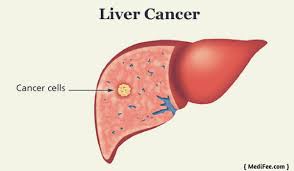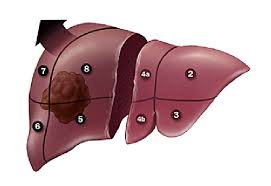CALL TODAY 646-846-1136 | EMAIL
Liver Cancer Surgery: Steps, Benefits, Side-Effects, Precautions & Prognosis
 When an area of the human liver is surgically removed, it is known as the liver resection. The most typical reason for such operative procedures is to eliminate metastases of the liver, i.e., liver cancer. Metastases are essentially cancer-causing cells that have propagated from the liver to another area inside the body. Liver resection surgery is also recommended for benign liver problems.
When an area of the human liver is surgically removed, it is known as the liver resection. The most typical reason for such operative procedures is to eliminate metastases of the liver, i.e., liver cancer. Metastases are essentially cancer-causing cells that have propagated from the liver to another area inside the body. Liver resection surgery is also recommended for benign liver problems.
Steps
A liver surgery could either be laparoscopic, also known as minimally invasive, or traditional/open. The two major types of surgery for treating early liver cancer are as follows.
- Liver resection/lobectomy
Removing the cancerous and also the surrounding tissues in one’s liver is called a resection. When a lobe of the patient’s liver is removed, it is known as lobectomy/hemi-hepatectomy. - Liver transplant
It is performed in patients with HCC or hepatocellular liver cancer.
Benefits
 Resection means the partial or total removal of a body organ. The human liver’s phenomenal regenerative ability permits it to continue working, even when some parts of this vital organ are removed. Liver resection provides the best opportunity for long-term survival or even cure for patients with liver cancer. Removing a malignant tumor from one’s liver is the surest way of:
Resection means the partial or total removal of a body organ. The human liver’s phenomenal regenerative ability permits it to continue working, even when some parts of this vital organ are removed. Liver resection provides the best opportunity for long-term survival or even cure for patients with liver cancer. Removing a malignant tumor from one’s liver is the surest way of:
- Eradicating the cancer
- Preventing its growth to other regions of the body
- Curing cancer or extending one’s life expectancy
Side-Effects
- Excessive bleeding is pretty much standard for up to forty-eight hours post-surgery
- Acute (generally occurring in the first one to two weeks post-operation) or chronic (very rarely happening after a year post-surgery) rejection of the transplanted liver by the patient’s immune system
- Infection
- Sleep disturbances
- Depression and anxiety
Precautions
Wound care:
- The patient should religiously follow the instructions provided by the caregiver.
Care provider should be contacted if the:
- Patient has a fever
- Wound is swollen, warm, and red
- Region surrounding the wound is painful and does not subside with medication or rest
- Stitches are found to be becoming loose
- Patient is experiencing trouble breathing or chest pain and which is becoming worse over time
- Patient is not able to ingest and is losing weight
- Foul smelling leakage is oozing from the wound
- Experiencing severe pain in the upper abdomen
- Skin of the patient is turning yellow, or the eyes are becoming white
- Wound is bleeding continuously and without any cessation
- Patient is experiencing new and sudden pain in one’s chest, which intensifies at the time of coughing or taking deep breaths, and may also cough up blood
- One has difficult breathing and suddenly feels lightheaded
- One’s leg or arm feels painful, tender, and warm; and may even appear red and swollen
Prognosis
The (National Cancer Institute’s Surveillance, Epidemiology, and End Results) SEER database classifies cancer cases into the following summary stages:
- Thirty-one in every hundred patients with localized liver cancer
- Eleven in every hundred patients with regional liver cancer
- Three in every hundred patients with distant liver cancer
Note: The figures mentioned above indicate to the five-year survival rate in all the three stages.
Conclusion
Surgical resection is usually recommended for patients diagnosed with major and minor liver tumors. Mortality and morbidity rates have increased for sure, after the recently growing trend of applying newer surgical procedures like laparoscopic liver resection using radio-frequency ablation to transect liver parenchyma.
Contact us today to schedule an appointment and get the required care as soon as possible.
References
- https://www.ncbi.nlm.nih.gov/pmc/articles/PMC2828596/
- https://www.cancerresearchuk.org/about-cancer/liver-cancer/treatment/surgery/liver-transplant/problems-after-surgery
- https://www.drugs.com/cg/liver-resection-aftercare-instructions.html
- http://www.upmc.com/SERVICES/LIVER-CANCER/TREATMENTS/SURGICAL-RESECTION/Pages/default.aspx
- https://www.cancerresearchuk.org/about-cancer/liver-cancer/treatment/surgery/types-surgery


